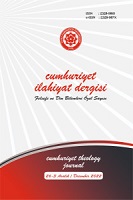Molla Sadrâ’nın İdealar İspatlaması
Mulla Sadrā’s Proof of Ideas
Author(s): Fevzi YiğitSubject(s): Metaphysics, Islam studies, Philosophy of Middle Ages, Middle-East Philosophy, Philosophy of Religion
Published by: Cumhuriyet Üniversitesi İlahyat Fakültesi
Keywords: Islamic Philosophy; Mulla Sadrā; Ibn Sīnā; Suhrawardī; Ideas;
Summary/Abstract: One of the most controversial issues in the history of philosophy is the theory of ideas. Mulla Sadrā states that he is the person who truly understands the ideas in the process from Plato to himself, and even, that he is alone in this regard. Sadrā says that he achieved this success thanks to his discovery and inspiration, as well as his being-centered philosophical system. He attributes the difficulty in knowing the ideas to the inability of the mind to comprehend pure and luminous beings. Just as strong lights dazzle the human eye or distant objects do not appear clearly, the human mind perceives ideas as vague and universal concepts. Ideas are universal, but not in the logical sense. For ideas are abstract luminous beings, not things that come out of a mental abstraction and generalization process. For this reason, divine help and intuition are needed in order to understand them. Based on the principle that the like can be known through the like, people who have melted their entire existence in the pure mind and perceive the ideas as the talisman of every species, the strong sustainer and ruler of the species. Although the ideas are not universals that are the product of the mind, they give power and light to the mind in creating logical universals. In that case, it is obvious that in the absence of ideas, it is not possible to talk about real knowledge. In other words, knowing something mentally means that it is at the ideal level of being. Otherwise, neither the fixed existence nor the knowledge of the thing can be mentioned. According to him, the issue of existence must be resolved in order to understand the ideas. It does not seem possible to grasp the solution of the problem of ideas without understanding the unity, organization and nobility of existence. Accordingly, while the idea of unity of existence solves the problem of getting a share, the idea of tashkīk makes it possible to distinguish between ideas and their individuals. The nobility of existence allows the multi-structure of the ideal realm to be performed in unity. Sadrā finds Avicenna's attitude on the subject of ideas strange because he did not take into account Esûlûjyā and the proofs developed accordingly. Also, he does not have the knowledge of the discovery of ideas. Sadrā sees Suhrawardī as the philosopher who comes closest to the truth on the subject. While proving the ideas, Sadrā does not hesitate to use the proofs developed by the defenders of the idea like Suhrawardī, but he states that only he has reached the truth of them. According to Sadrā, it is certain that the natural world is a product of the mind, so the existing ones must have prototypes in the abstract world. This situation is based on the ontological principle of priority and posteriority. That is, what is simple and abstract must come first. For the composite and material is the thing that comes into existence later. This is another expression of the rule of imkān al-ashraf. When the mind examines something existing in the realm of possibility, it judges that its higher possibilities must have existed before. Another proof is the principle of “The Supreme does not exist for the lower one.” In that case, Ideas do not exist for the corporeal species and their individuals below them. For this situation requires that the things that are taken as ideas and models to be more honorable and superior than the ideas. On the contrary, the forms of corporeal species are the mold and shadow of these intellectual and luminous forms. When the ideas are identified with both the knowledge of God and the divine names, they do not have their own existence, or any aspect that can cause multiplicity. In the creation of the universe, while the ideas correspond to the minds and are passive towards God, they are active compared to the beings below them. At this point, it should be said that ideas are often confused with qualities obtained by mental abstraction. In Sadrā's philosophy, quiddities are nothing but forms of existence. It can be said that within the framework of Sadrā's understanding of emanation, existence is divided into two as common/exclusive and ideas, and these two combine to create beings. In this respect, it is seen that Sadrā places the ideas in the position of form and the common being in the position of matter.
Journal: Cumhuriyet İlahiyat Dergisi
- Issue Year: 26/2022
- Issue No: 3
- Page Range: 1127-1141
- Page Count: 15
- Language: Turkish

